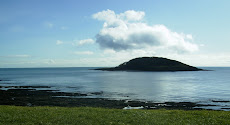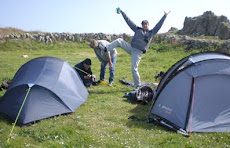 Bird spotters will be flocking to the South West after a potential first for the western palearctic was found near Plymouth. Experts are also considering the possibility that the bird may be a species new to science, and that this may be the most important ornithological discovery since Mr Bewick hung up his shotgun.
Bird spotters will be flocking to the South West after a potential first for the western palearctic was found near Plymouth. Experts are also considering the possibility that the bird may be a species new to science, and that this may be the most important ornithological discovery since Mr Bewick hung up his shotgun. The potential new species of duck is believed to be distantly related to the humble mallard, but through a remarkable genetic isolation lasting several years is now considered to be a separate genome. This has nothing whatsoever to do with the urgent need to find more ticks that has led to the splitting of redpoll into three thousand distinct species, and the decision that actually every chiffchaff you see is probably a different, but closely related species. As Professor Levens states in his book "the science of splitting - a roadmap to the 600 club" - the old fashioned idea that if a bird looks identical and sounds identical it must be the same species is as outdated as the view that all Lady Amherst's pheasants in the home counties aren't tickable.
And if this discovery weren't enough the same top  secret location has already turned up another remarkable find. This picture of a drake Mandarin which was described as "wary" and "sort of full winged" demonstrates the very special nature of the site, which is set to become a mecca for twitchers from across the world. Experts have conjected that the presence of these species at one small site may have something to do with the unique habitat, the most important element of which is considered to be the almost abnormal presence of stale bread floating in the water, a fact which is yet to be explained.
secret location has already turned up another remarkable find. This picture of a drake Mandarin which was described as "wary" and "sort of full winged" demonstrates the very special nature of the site, which is set to become a mecca for twitchers from across the world. Experts have conjected that the presence of these species at one small site may have something to do with the unique habitat, the most important element of which is considered to be the almost abnormal presence of stale bread floating in the water, a fact which is yet to be explained.
 secret location has already turned up another remarkable find. This picture of a drake Mandarin which was described as "wary" and "sort of full winged" demonstrates the very special nature of the site, which is set to become a mecca for twitchers from across the world. Experts have conjected that the presence of these species at one small site may have something to do with the unique habitat, the most important element of which is considered to be the almost abnormal presence of stale bread floating in the water, a fact which is yet to be explained.
secret location has already turned up another remarkable find. This picture of a drake Mandarin which was described as "wary" and "sort of full winged" demonstrates the very special nature of the site, which is set to become a mecca for twitchers from across the world. Experts have conjected that the presence of these species at one small site may have something to do with the unique habitat, the most important element of which is considered to be the almost abnormal presence of stale bread floating in the water, a fact which is yet to be explained.Other news from today - but obviously paling into insignificance in the light of the above - is that I actually went on A TWITCH. Now before you start scoffing inwardly, it was a twitch that involved driving all of 5 miles, and was also en route to buying a new washing machine (a mission which was doomed to failure when met with the several hundred models on offer - I think some lumping is required in the white goods department), so it wasn't really a twitch, honest. However, it did involve standing in a muddy field for half an hour gazing at a strip of set aside and a hedge (the fact that for the most part I was sharing said field with one other person also made it feel un-twitch like). And it was also rewarded with brief, but good views of a Little Bunting. Only the second I've seen so well worth the slight diversion. How far I've come from being a "Proper birder" is demonstrated by the fact that I was seriously in two minds as to whether to bother. It was a stunning spot overlooking the river Lynher and the sojourn was also enlivened by an overflying Greenshank and a couple of Red breasted Merganser.
But the biggest news of today is that the Assistant Clerk of Works uttered the word "pie" for the first time. I was so proud.








I would like to think that it was Pi that was uttered by the ACoW.Roughly 355/113. Point 2... it has long been known that Mallards are in fact made of bread... spontaneous regeneration and such like. It's on the GCSE syllabus... leave 18 crusts overnight on a riverbank.... next morning they've all gone, and Mallrds have appeared.
ReplyDeleteIt's a no-brainer mate!
As for the Dun Cow.... I do think the clientele has gone downhill though.... if the concept of "downhill" exists round there.
Best wishes from Ray, just off to teach Beauty Therapists an soupcon of Maths.